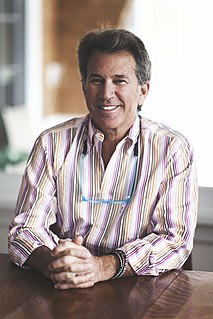A Quote by B. F. Skinner
If the world is to save any part of its resources for the future, it must reduce not only consumption but the number of consumers.
Related Quotes
The vision behind our idea is a world where people don't carry hazardous chemicals in their bodies, the environment is free of toxic pollutants, and the economy diligently conserves its natural resources for consumers and future generations. We want to make it easier for consumers to create this world through their purchasing decisions and everyday activities.
Women are clearly the major consumers in far more than just female categories. It doesn't matter whether it is purchases of cars, cosmetics, or even products for men, female consumption power is the leading consumption power in the world. Any company that overlooks the woman as the decision maker is making a huge mistake.
I must say that in my own mind, I think what's important is for us, as a society, to radically reduce the consumption of meat. This is more important than some fraction of us become moral saints and become vegetarians so it would be much better if we would reduce meat consumption by three quarters of each of us as an individuals would only eat one-quarter as much meat as we do now then that half of the population should become vegetarian. We should see this as a collective challenge rather than an issue about individual, moral period.
In most of the affluent populations I have considered, the prevalence of coronary disease is associated with the consumption of sugar. Since sugar consumption is only one of a number of indices of wealth, the same sort of association (to coronary disease) exists with fat consumption, cigarette smoking, cars.
To achieve true sustainability, we must reduce our "garbage index" - that which we permanently throw away into the environment that will not be naturally recycled for reuse - to near zero. Productive activities must be organized as closed systems. Minerals and other nonbiodegradable resources, once taken from the ground, must become a part of society's permanent capital stock and be recycled in perpetuity. Organic materials may be disposed into the natural ecosystems, but only in ways that assure that they are absorbed back into the natural production system.
The public sector can only feed off the private sector; it necessarily lives parasitically upon the private economy. But this means that the productive resources of society - far from satisfying the wants of consumers - are now directed, by compulsion, away from these wants and needs. The consumers are deliberately thwarted, and the resources of the economy diverted from them to those activities desire by the parasitic bureaucracy and politicians.
We must work to repeal trade agreements that impede access to affordable generic drugs. We must work to cause the IMF and the World Bank to reduce and eventually eliminate the debt that takes poor nations' resources away from crises like AIDS. We must focus America's leadership on addressing and ending this epidemic.
Food security is an authentically human requirement. Guaranteeing it for present and future generations also means safeguarding ourselves against the uncontrolled exploitation of natural resources. Indeed, the process of consumption and waste seems to overlook any concern for ... biodiversity, which is so important for agriculture.






































